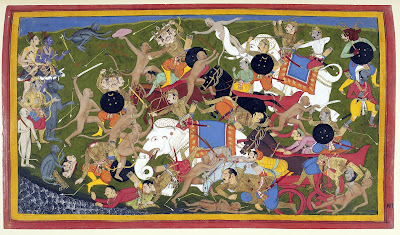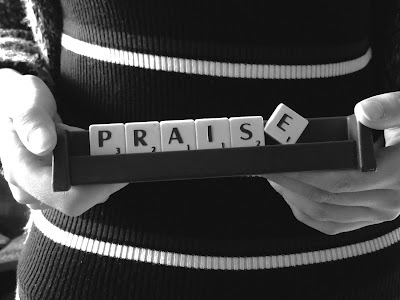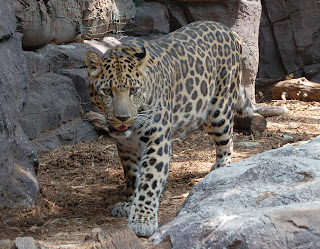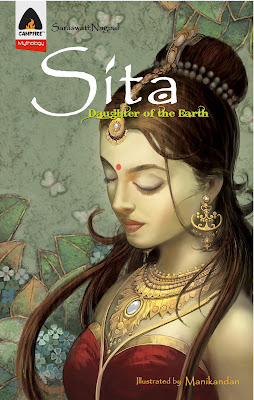Reading Notes: Narayan's Ramayana Part D
The Ramayana, Pages 131-157
Characters: Rama, Vibishana, Lakshamana, Sugreeva, Hanuman, Ravana, Sita, Angada, Indrajit, Kumbakarna, Matali (charioteer of Indra's chariot),
POV: Narayan translates the poet Kamban's version of The Ramayana
Setting(s): Lanka (kingdom of Ravana), Adyodhya (now Rama's kingdom)
Deities and demons: Shiva (referenced), Vishnu (referenced), Brahma, Ravana, unnamed sea god, Indra
Favourite sentences/phrases:
Chapter 10: Across the Ocean
Vibishana beseeches Rama to let him join his company against Ravana; after deliberation and advice from Hanuman, Rama allows him to help; Vibishana advises Rama on Ravana's battle and army strategy; Rama requests that the sea god help them traverse the ocean to Lanka; after a possible show of his humanity through anger, Rama is able to convince him and they work together to build a bridge.
Chapter 11: Siege of Lanka
The battle begins and Ravana's city and armies are ravished by Rama and his armies; Ravana calls on his brother Kumbakarna who is extremely powerful, but he too is defeated; Rama's army is bombarded by both physical and mental weapons (illusions of Sita being killed); after what seems like a battle never to end, Ravana considers killing Sita to end it, but decides to fight himself alongside his armies.
Chapter 12: Rama and Ravana in Battle
The epic comes to a close with this chapter, the test of Rama and the ultimate battle between he and Ravana ensues; Rama tries to cut off Ravana's heads in this battle but every one that is cut grows another in its place; after an almost never-ending battle, where they throw both physical weapons of the gods and incantations (mental weapons like illusions and magic), Rama (on the chariot of Indra) finally defeats Ravana with the Brahmasthra, piercing him threw the heart; Rama actually worries he brought a dishonourable death unto Ravana, thinking he had hit him in the back but he is reassured it was honourable. The war is over.
Chapter 13: Interlude
[an extract from the Valmiki] Here Rama and Sita are reunited but Rama is 'moody' and reluctant, telling Sita since she lived alone with Ravana for so long she is no longer 'pure' or virtuous (even though this poor woman lived in torment and denied every one of Ravana's advances without knowing if Rama would ever come for her); Sita proves herself by entering the fire and being delivered by the fire god Agni; he 'accepts' her then
Chapter 14: The Coronation
It is time for Rama to return to Ayodhya; and become crowned as king; after Rama makes Sita proves her virtue, the gods question the probably confinement of the mortal form that is Rama for Vishnu and pronounce its limitations; Dasaratha visits Rama from the heavens and on Rama's request, agrees to forgive Kaikeyi and her son, Bharatha; Bharatha awaits Rama's return; when he does he is received with warm welcome and by family
Epilogue
Narayan ends the tale by informing the readers that the ending is where the narrator usually prolongs the story in tradition; the wrap up is more of a ceremony; Rama is crowned king at last; Narayan does not go on to tell of the Valkimi version which talks of Sita and Rama's troubles and their children.
Reference: R. K. Narayan. The Ramayana [Print].
Characters: Rama, Vibishana, Lakshamana, Sugreeva, Hanuman, Ravana, Sita, Angada, Indrajit, Kumbakarna, Matali (charioteer of Indra's chariot),
POV: Narayan translates the poet Kamban's version of The Ramayana
Setting(s): Lanka (kingdom of Ravana), Adyodhya (now Rama's kingdom)
Deities and demons: Shiva (referenced), Vishnu (referenced), Brahma, Ravana, unnamed sea god, Indra
Favourite sentences/phrases:
"As the fury of the battle grew, both sides lost sight of the distinction between night and day."
"Rama displayed the tribulations and the limitations of the human frame and it was necessary from time to time to remind him of his divinity."Section Summaries:
Chapter 10: Across the Ocean
Vibishana beseeches Rama to let him join his company against Ravana; after deliberation and advice from Hanuman, Rama allows him to help; Vibishana advises Rama on Ravana's battle and army strategy; Rama requests that the sea god help them traverse the ocean to Lanka; after a possible show of his humanity through anger, Rama is able to convince him and they work together to build a bridge.
Chapter 11: Siege of Lanka
The battle begins and Ravana's city and armies are ravished by Rama and his armies; Ravana calls on his brother Kumbakarna who is extremely powerful, but he too is defeated; Rama's army is bombarded by both physical and mental weapons (illusions of Sita being killed); after what seems like a battle never to end, Ravana considers killing Sita to end it, but decides to fight himself alongside his armies.
Chapter 12: Rama and Ravana in Battle
The epic comes to a close with this chapter, the test of Rama and the ultimate battle between he and Ravana ensues; Rama tries to cut off Ravana's heads in this battle but every one that is cut grows another in its place; after an almost never-ending battle, where they throw both physical weapons of the gods and incantations (mental weapons like illusions and magic), Rama (on the chariot of Indra) finally defeats Ravana with the Brahmasthra, piercing him threw the heart; Rama actually worries he brought a dishonourable death unto Ravana, thinking he had hit him in the back but he is reassured it was honourable. The war is over.
Chapter 13: Interlude
[an extract from the Valmiki] Here Rama and Sita are reunited but Rama is 'moody' and reluctant, telling Sita since she lived alone with Ravana for so long she is no longer 'pure' or virtuous (even though this poor woman lived in torment and denied every one of Ravana's advances without knowing if Rama would ever come for her); Sita proves herself by entering the fire and being delivered by the fire god Agni; he 'accepts' her then
Chapter 14: The Coronation
It is time for Rama to return to Ayodhya; and become crowned as king; after Rama makes Sita proves her virtue, the gods question the probably confinement of the mortal form that is Rama for Vishnu and pronounce its limitations; Dasaratha visits Rama from the heavens and on Rama's request, agrees to forgive Kaikeyi and her son, Bharatha; Bharatha awaits Rama's return; when he does he is received with warm welcome and by family
Epilogue
Narayan ends the tale by informing the readers that the ending is where the narrator usually prolongs the story in tradition; the wrap up is more of a ceremony; Rama is crowned king at last; Narayan does not go on to tell of the Valkimi version which talks of Sita and Rama's troubles and their children.
The Battle of Lanka. Source: Pixabay




Comments
Post a Comment